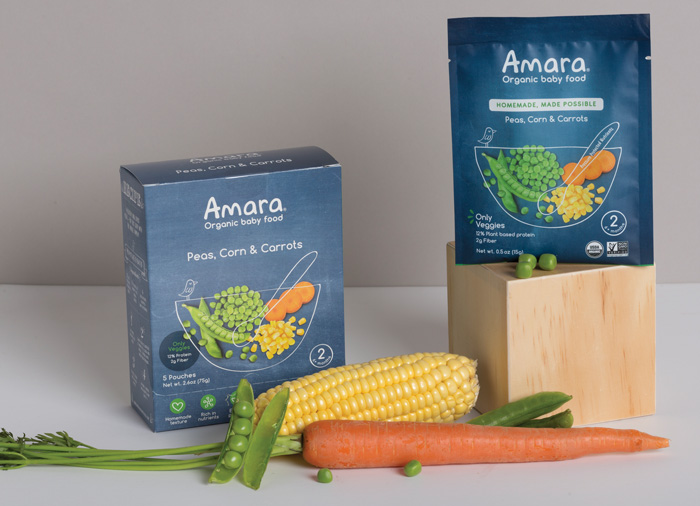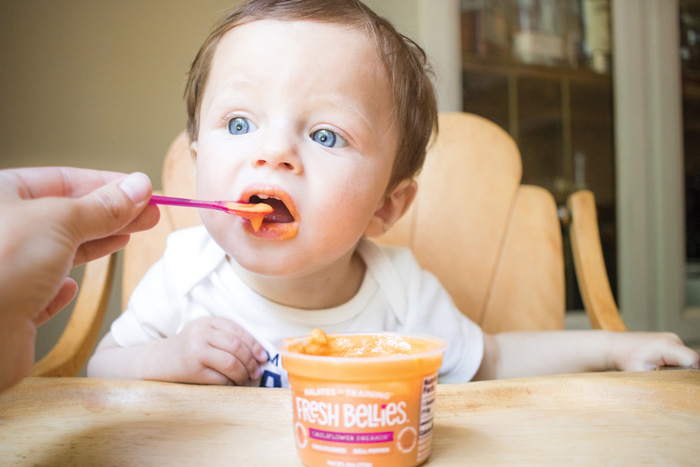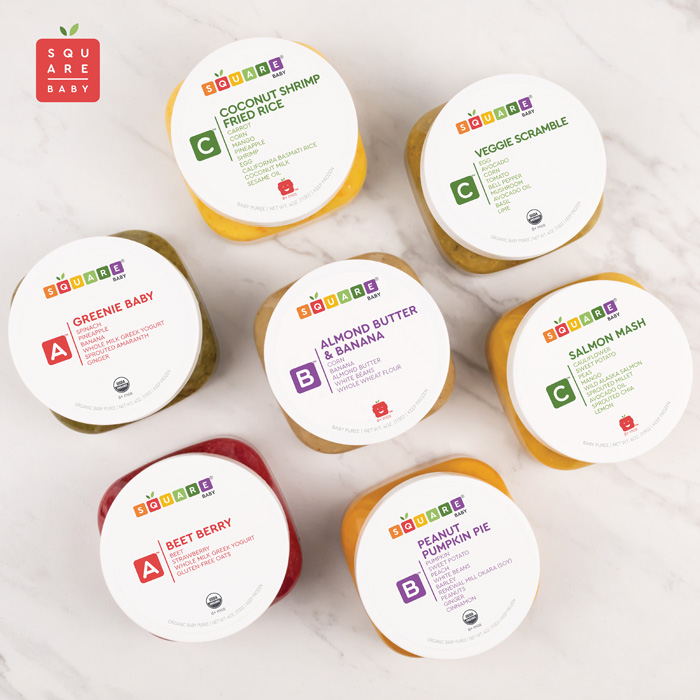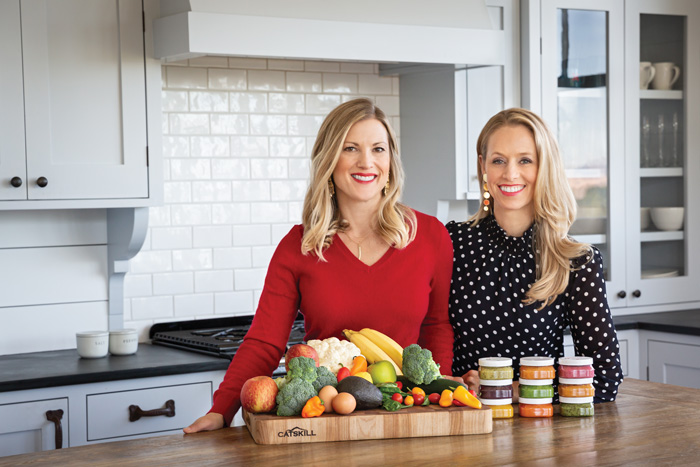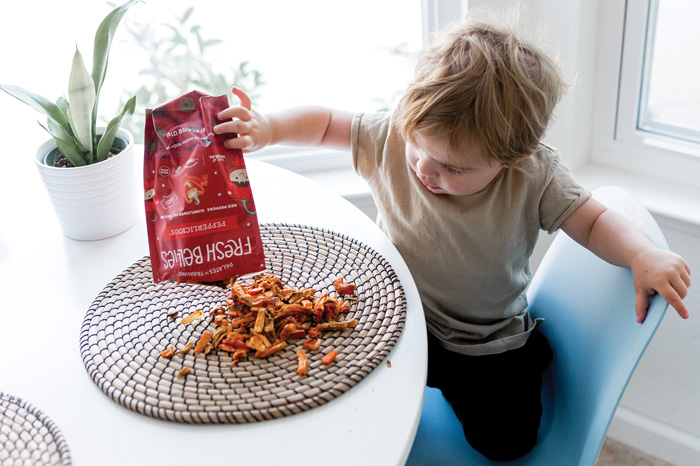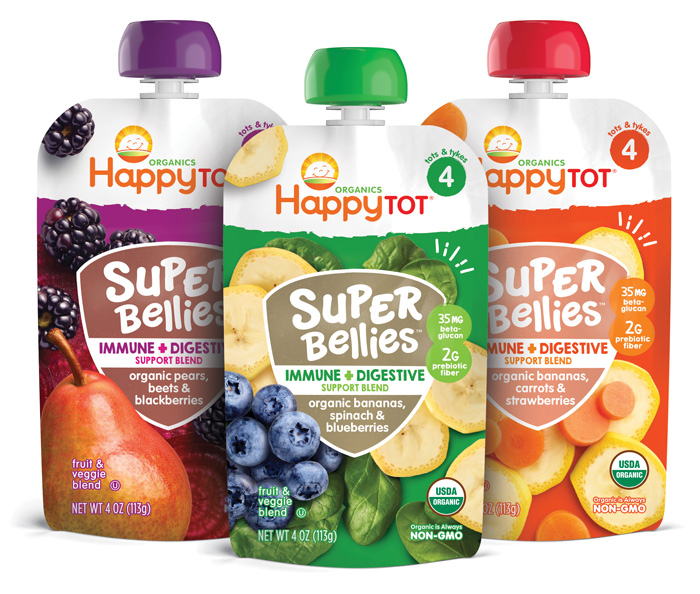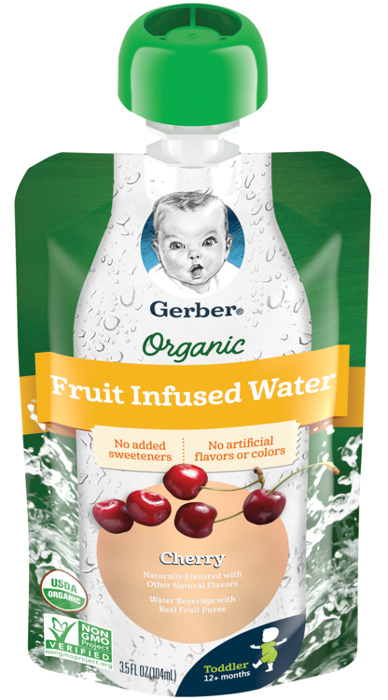
Feeding Baby Better
Health-aware entrepreneurs have spawned a new breed of baby food products that give parents what they want most—optimal nutrition for their babies.
Article Content
Parents are prioritizing health factors above all when deciding what to feed their babies, notes global market researcher Mintel. They want more fruit and vegetables in their babies’ diets and are paying close attention to organic and natural claims. They are concerned about meeting their infants’ needs for protein, vitamins, and minerals, as well as supporting their immune systems and cognitive development, according to Baby Food and Drink, U.S., a report published earlier this year (Mintel 2020).
Consumers in general, and parents in particular, are shying away from artificial preservatives. They are buying fresh-tasting organic baby foods with clean ingredient decks, and they are looking for food that tastes good without the addition of salt or sugar, recognizing that training the palate to appreciate good, nutritious food can help keep their babies healthy and happy for life.
“Wholesome ingredients” and longer shelf life are driving growth in the baby food market, according to a recent report on the infant nutrition market by Allied Market Research (2020). Organic baby food and baby food with prebiotics and probiotics offer “lucrative opportunities in the near future” for baby food marketers, the report notes.
The global prepared baby food category is projected to achieve a compound annual growth rate (CAGR) of 10.4% from 2019 to 2026, according to Allied. In the United States, baby food and drink sales are projected to exceed $7 billion for 2020, according to Mintel.
Declining birth rates are the biggest challenge facing the category, says Mintel. In 2007, there were 69.3 live births for every 1,000 women aged 15 to 44. By 2017, that dropped to 60.3, according to the U.S. Centers for Disease Control, National Center for Health Statistics, National Vital Statistics Reports.
There is a growing body of evidence demonstrating how critical proper nutrition is to promote health and prevent chronic disease beginning from life’s earliest stages. So for the first time, an examination of dietary recommendations for children younger than two years is included in the U.S. Department of Agriculture’s (USDA) Scientific Report of the 2020 Dietary Guidelines Advisory Committee, which was published online in July 2020.
Additionally, the report notes, “Nutritional exposures during the first 1,000 days of life not only contribute to long-term health, but also help shape taste preferences and food choices.”
The report addresses two ongoing concerns regarding infant nutrition: sugar reduction and allergen exposure.
It suggests consuming even less added sugar than it considered advisable five years ago—less than 6% of daily energy intake, down from less than 10%. For Americans one year and older, average added sugar consumption is too high at 13% of daily energy intake, the report states.
Regarding allergens, the report acknowledges that historically, preventing food allergies focused on postponing the introduction of potentially allergenic foods. However, new evidence indicates that such foods should be introduced early, after four months but no later than one year, and the report explains, “the committee found no evidence that avoiding such foods in the first year of life is beneficial with regard to preventing food allergies or other atopic or allergic diseases.”
Preservation Without Preservatives
Convenient, shelf-stable baby food can require preservatives, and that’s a problem for many of today’s young parents. Food technology company Amara developed a solution.
“Pressure protection” is the proprietary process Amara uses to lock in the taste, texture, and nutrients of the baby food it makes from fresh organic and GMO-free ingredients, explains Jessica Sturzenegger, chief executive officer and co-founder.
Developed with food scientists, nutritionists, and engineers over the course of three years, the process applies pressure to remove water from fresh fruits, vegetables, and grains. The food is then ground into powder, rendering it shelf-stable for 12 to 18 months. For consumption, it is reconstituted with breast milk, water, or baby formula.
“We’re doing something pretty different, but it was time for baby food to change, to [offer] more nutrition,” says Sturzenegger.
Co-founder Vicki Johnson is a chef. Chief Nutritionist Sonia Schiess has a PhD in human nutrition, extensively studied infant nutrition, and was involved in the European Union’s Childhood Obesity Project.
Though baby food packaging formats have changed over the past two decades—with more pouches and fewer jars—manufacturers “didn’t actually change what was inside,” Sturzenegger says.
Today, the category is changing “to prioritize what the consumer wants most—nutrition.” From frozen baby food delivery startups to nutrient protection techniques like Amara’s—“all the newer brands are disrupting the category to offer the nutrients of fresh,” Sturzenegger says.
One of Amara’s selling points is affordability—meals are priced under $3. They are sold in grocery stores throughout the United States and on the company’s website and Amazon.
Amara’s Introduction to Baby Vegetables Pack includes Kale Veggie Mash; Peas, Corn & Carrots; Sweet Potato Raspberry; Pumpkin Pear; Black Bean Sweet Corn; and Oats n’ Berries. The Introduction to Solids Variety Pack includes Box of Banana, Tropical Mango and Potato, and Kale Veggie Mash.
Designed to ease baby’s digestion, improve the gut microbiome, and reduce inflammation, Amara’s Anti-Inflammatory Immunity Variety Pack includes Oats n Berries, Applesauce with Maqui Berry, and Box of Banana.
Products in Amara’s Breakfast Variety Pack for Baby and Toddler contain 50% less sugar than leading breakfast oatmeal baby brands, according to the company. It includes Oats n’ Berries and Ancient Grain Cereal.
More Savory, Less Sugar
The tastes infants develop early tend to last, exerting ongoing influence on their eating habits and overall health, nutritionists agree.
While the image of a baby spitting out his or her first few tastes of mashed vegetable is a common and discouraging one, many parents don’t realize that’s part of the process. Food preferences are mostly learned, and it can take as many as eight attempts for babies to get used to, and learn to like new foods—including vegetables—according to a study done by Pennsylvania State University’s Department of Human Development and Family Studies, as reported by the Kiddo Feedo website in a post titled “5 Common Baby Food Myths.”
So while vegetables and other savory tastes may not necessarily be an infant’s first love, with the right encouragement, they can fall in love with them. For those tastes to develop, however, it’s important that vegetable flavors not be masked by the addition of fruit, as this can train babies to prefer sweet tastes over savory, concludes Pennsylvania State University Department of Food Science research published in the journal Appetite (Bakke et al. 2020).
Frustrated by the lack of commercially prepared baby food she considered nutritious, tasty, and vegetable-forward enough, Saskia Sorrosa, an Ecuadorian-born former National Basketball Association executive, set about to create her own. She founded a company called Fresh Bellies and serves as its chief executive officer.
The company’s line of USDA Certified Organic vegetable purees, seasoned with herbs and spices, plant-based oils, and sometimes a splash of lemon juice, are refrigerated and free from preservatives.
Fresh Bellies has gone national, landing in 3,500 U.S. stores and is on track to double the number of stores carrying its products, Sorrosa adds.
Mother to daughters now six and eight, Sorrosa was inspired by the flavors and food she grew up with in South America. “From the moment I started eating solids, everything had onions or garlic in it,” she chuckles.
Adding herbs and spices to infant food was a Fresh Bellies innovation that has since been adopted by other commercial baby food makers, although infants around the world are routinely fed boldly flavored food from a very young age, Sorrosa points out.
“When I started this business five years ago, it was really a novelty concept to have a savory, no [fruit] sugar-added baby food,” Sorrosa recalls. “Most baby foods mix fruits and veggies. They don’t expose babies’ palates to the flavors of veggies.
“Not only are pediatricians recommending that parents feed babies and toddlers the way we are, we’re also riding this wave of parents looking for products like ours. We are meeting a need for products that parents haven’t been able to find,” Sorrosa says. Fresh Bellies makes fruit purees as well, but fruit and vegetables are never mixed in the company’s products, Sorrosa emphasizes.
Sorrosa’s concern about climbing rates of childhood obesity in the United States was an additional inspiration. Developing the palate for good-for-you foods early and shunning the sugar, salt, and preservative content of commercially prepared baby and toddler foods addresses that problem squarely, she adds.
The purees, which are also marketed for toddlers as pasta and toast toppings as well as on their own as snacks, are packed in clear BPA/PVC-free cups with spoons nestled in the lid to encourage mindful eating habits. A six-pack baby food starter kit sells for $20.99 on the company website.
The vegetable purees include Broccoli Ever After, Cauliflower Dreamin’, and We Got The Beet, and Fresh Bellies’ organic fruit purees come in A Pearfect Pair, Apple of My Eye, and Keep Calm & Cardamom varieties.
Sorrosa started out selling her baby food in the farmers markets of New York, but her January 27, 2019, appearance on the ABC television network’s Shark Tank, a reality TV competition show where entrepreneurs pitch their business proposals to a panel of investors, turned out to be the catalyst for Fresh Bellies’ phenomenal growth.
A wave of interest from retailers soon followed. “Shark Tank really put our business on the map,” she says. Even now, she continues, “Every time the episode airs, we get a surge in orders.” Fresh Bellies’ revenue grew 700% in 2019, she confirms.
International flavors are featured in the fresh, organic, vegetable-forward baby food purees from lil’ gourmets, which launched its first test market in 2018.
Based on recipes from Morocco, India, Spain, Australia, the Middle East, and the United States, lil’ gourmets’ meals are 70% to 95% vegetables and beans, combined with ingredients such as coconut milk and olive oil and seasoned with the company’s chef-crafted spice blends. No sugar or salt is added to any of the meals, and naturally occurring sugars range from 2 to 5 grams, according to the company.
Two new flavors were launched in March 2020—Pumpkin Navy Bean Shawarma and Spanish Corn & Bean Gazpacho. Meals are minimally processed via nonthermal high pressure processing, sold refrigerated, and also include Cinnamon Beets & Apples, Coconut Cauliflower Mash, Moroccan Butternut Squash, and Sweet Potato Curry.
Ranging in price from $3.49 to $3.99 per 3.5-ounce cup, the meals are available in select Target and Meijer stores in the Midwest, some Chicago area groceries, and via the company website and Amazon.
Aiming to Prevent Food Allergies
Food allergies strike terror in the hearts of parents, forcing them to worry that a tiny, unintended taste of a dangerous ingredient could be lurking in an otherwise innocent bit of food that could send their child to the emergency room—or worse.
For decades, pediatricians and allergists advised parents to avoid feeding babies foods that could cause allergic reactions, such as peanuts, shellfish, or soy. But more recent clinical trials indicate that introducing allergenic foods to babies early and often can prevent food allergies from developing. That is what the American Academy of Pediatrics (AAP) now recommends.
Square Baby, the brand of Square Foods, offers an Early Allergen Introduction Menu of complete baby meals that includes all of the top allergens in its lineup: wheat, egg, soy, peanut, tree nuts, fish, shellfish, milk, coconut, and sesame.
Made fresh in small batches with organic, whole foods, the meals are immediately frozen and shipped to customers’ homes every two weeks in recyclable cooler boxes with 100% compostable insulation packed with dry ice.
Square Baby’s balanced Square Meals are customized for baby’s age and developmental stage by the company’s team of nutritionists and pediatricians.
The company’s Square Meal System plan follows USDA and AAP recommendations for daily servings of fruits, vegetables, grains, proteins, and healthy fats. There are vegetarian meals (with protein from whole milk Greek yogurt), vegan meals (with protein from sprouted lentils, beans, okara soy, nuts, and legumes), and animal protein meals (with protein from organic chicken and turkey bone broth, salmon, egg, and shrimp). Meals range in price from $4.98 to $5.64 depending on the
number of meals in the subscription. Shipping is free.
The Square Baby subscription service launched in 2018 with 20 products, and recently added three new meals to the Allergen Introduction Menu: Peanut Pumpkin Pie, Coconut Shrimp Fried Rice, and Almond Butter & Banana.
“As a nutrition science–based company, we’ve always been a proponent of early allergen introduction. Recent research shows that you can prevent food allergies by up to 80% by introducing allergens early and often,” explains Katie Thomson, a registered dietitian with a master’s degree in nutrition, who is co-founder and chief executive officer of Square Foods.
“Our research indicated parents have a really hard time finding allergen introduction options that come from fresh, organic, whole foods. We are so proud to be the first and only baby food company to have a comprehensive allergen introduction menu,” Thomson adds.
Thomson and co-founder Kendall Glynn, a biophysicist and geneticist who serves as chief operating officer, worked with pediatricians to develop the recipes to address developmental milestones and the need for important nutrients like iron, vitamin C, zinc, biotin, choline, probiotics, omega-3s, and protein.
Square Baby currently ships to eight states on the U.S. West Coast and is working on a national launch in early 2021. Square Baby products are sold through its website as well as its retail store and tasting bar in Orinda, Calif., where the company is based.
“We pride ourselves on being a nutrition-focused, science-based company. Each of our meals is nutritionally balanced and, when combined, [they] offer 100% of baby’s daily nutrition recommended by the American Academy of Pediatrics,” says Thomson.
As new mothers, Thomson and Glynn were both frustrated by commercially available baby food they considered unappealing, unbalanced, lacking premium proteins and healthy fats, misleadingly marketed, and packaged in unrecyclable pouches that denied babies the opportunity to develop the important motor development skill of spoon feeding. Moreover, they felt the products on the market contained far too much fruit sugar and lacked the fresh flavors, colors, and textures that are crucial to palate development.
“Baby food that’s older than your baby isn’t appealing or inspiring. It’s not what parents ideally want for their baby’s first bites—or how they envision fostering a love for food that will impact their health and food choices for a lifetime. But the reality is that many parents feel stuck between choosing the convenience of store-bought or the quality of homemade,” says Thomson.
There has been a lot of innovation in the baby food category over the past five years, Thomson notes, but parents still struggle to find ready-made food they feel is good enough for their babies.
“We created Square Baby to solve for every pain point we had when feeding our kiddos,” Thomson adds.
REFERENCES
Allied Market Research. 2020. Infant Nutrition Market by Product Type, Form and Distribution Channel: Global Opportunity Analysis and Industry Forecast, 2018–2026. Allied Market Research, Portland, Ore. alliedmarketresearch.com.
Bakke, A., E. M. Carney, M. J. Higgins, et al. 2020. “Blending dark green vegetables with fruits in commercially available infant foods makes them taste like fruit.” Appetite 150: July. https://doi.org/10.1016/j.appet.2020.104652.
Mintel. 2020. Baby Food and Drink, U.S. Mintel Intl., London. mintel.com.

